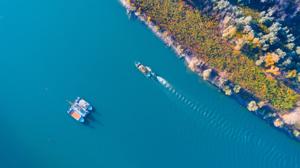Large Marine Ecosystems Approach: An Essential Management and Partnership Tool for Realizing Blue Economy Opportunities

Side event organized by Vladimir Mamaev, United Nations Development Programme (UNDP)/ - lead organizer
Julian Barbiere, Intergovernmental Oceanographic Commission (IOC) of UNESCO (IOC)
Christian Severin, Global Environment Facility (GEF)
Yegor Volovik, UN Environment
Time: 1130-1300 Tent A Venue: Kenyatta International Center (KICC)
The Blue Economy concept identifies the oceans as areas for potential sustainable development of existing and new sectors, including tourism, extractive industries, renewable energy production, infrastructure, fisheries and aquaculture, coastal urban development and marine transport. To foster innovation towards more sustainable use of marine and coastal resources there is a need for coastal and island nations to initiate appropriate governance processes, including among them the Marine Spatial Planning (MSP). These processes will foster a holistic understanding of the opportunities and constraints that lies within Exclusive Economic Zones (EEZs), and beyond, to inform strategy and policy formulation and adoption, and investments towards long-term environmental sustainability. Increasing Blue Economy opportunities requires both regional cooperation and national action.
Already at the forefront of addressing these complex challenges are Large Marine Ecosystems (LMEs), which bring together multiple nations at the ministerial level to work together toward shared ocean governance. Most of the world’s 66 LMEs are typically multi-national and often individually cover over 200,000 km2. These LMEs include near-shore coastal waters from river basins and estuaries, and reach the seaward boundaries of continental shelves and outer margins of major ocean current systems. LMEs encompass areas with unique undersea topography and seabed characteristics, high productivity, important fisheries resources and a range of food chain interactions. LMEs harbor significant biodiversity and provide important ecosystem services, including food security, shoreline protection, and recreational opportunities. Taken together and according to some liberal estimates, LMEs contribute about $12 trillion in goods and services to the global economy. LMEs are important because they could be considered as a unique “platform” that brings countries together, at a high level, to work toward shared ocean governance. More so, the LME as a conceptual framework for partnership can help countries achieve SDG targets (especially SDG14) and help leverage sustainable Blue Economy gains.
In 1995, the Global Environment Facility adopted the concept of Large Marine Ecosystems — the majority of which are transboundary — as a conceptual and biogeographic framework for promoting sustainable, ecosystem-based management of the world’s oceans and coasts. The LME approach promotes the creation of new and/or reformed institutions, the reform and implementation of marine resource and environmental management policies and legislation, and the leveraging of public and private sector investment for LME restoration and protection. At a regional scale, the GEF has supported 23 of the 66 recognized Large Marine Ecosystems in which multiple countries collaborate on strategic, long-term ocean governance of transboundary resources. The GEF can assist countries in identifying sustainable public and private national investments within the Blue Economy space, through funding of collective management of coastal and marine systems and implementation of the full range of integrated ocean policies, legal and institutional reforms.
The existing relationships established through project implementation, including the coordination provided by various types of regional entities to continue dialogue, enable the various LME partnerships to help countries work across different sectors to leverage sustainable blue economy gains and opportunities. Importantly as well, cooperation for management at the LME level also provides a focus to scale-up existing investments and catalyze resources towards the achievement of SDG14 targets.
Expected Outcomes
The first outcome of the side event will be an increased understanding among Conference participants on how the LME approach and regional processes can be unique vehicle for leveraging the Blue Economy at the regional scale and across multiple sectors (such as tourism, fisheries, maritime transport, etc.). The second outcome will be an increased understanding among participants of the financing envelope during the 7th GEF Replenishment Cycle (2018-2022) available towards strengthening national Blue Economy opportunities. In GEF-7, investments will be strengthening nations Blue Economy opportunities, through three areas of strategic action: 1) sustaining healthy coastal and marine ecosystems; 2) catalyzing sustainable fisheries management; and, 3) addressing pollution reduction in marine environments. The final outcome will be enhanced partnership across the institutions present at the conference, whether international organizations, countries, non-governmental organizations or the business community to engage in realizing sustainable blue economic gains.
Agenda
The first, opening, segment of the session will feature inspirational keynotes setting the context and concept of LMEs and how they provide a vehicle for realizing Blue Economy gains. The second, technical, segment of the session will focus on the different Blue Economy sectors and show how particular GEF LMEs (or other similar projects) can provide the partnership model to realize investments and gains in those sectors (inter alia, fisheries, mariculture, transport, tourism). The dialogue will feature LME practitioners from various regions, countries and agencies. Finally, the session will offer an interactive discussion with the audience.
Opening Keynotes :
Elizabeth Taylor Jay, Ambassador Extraordinary & Plenipotentiary Permanent Representative to UNEP & UN-Habitat from Colombia
Christian Severin, Senior Environmental Specialist, Global Environment Facility
Yegor Volovik, Portfolio Manager, GEF International Waters, UN Environment
Julian Barbiere, Head, Marine Policy and Regional Policy Implementation, Intergovernmental Oceanographic Commission of UNESCO
Interview Panel :
Facilitator: Vladimir Mamaev, United Nations Development Programme
Laverne Walker, United Nations Office for Project Services (GEF/UNDP Caribbean Large Marine Ecosystem Project)
Thandiwe Gxaba, Benguela Current Commission (GEF/UNDP/BCC Benguela Current Large Marine Ecosystem Project)
Dixon Waruinge, Nairobi Convention Secretariat, UN Environment (Western Indian Ocean, Agulhas & Somali Current Large Marine Ecosystems)
Open Questions
Closing Summary

























